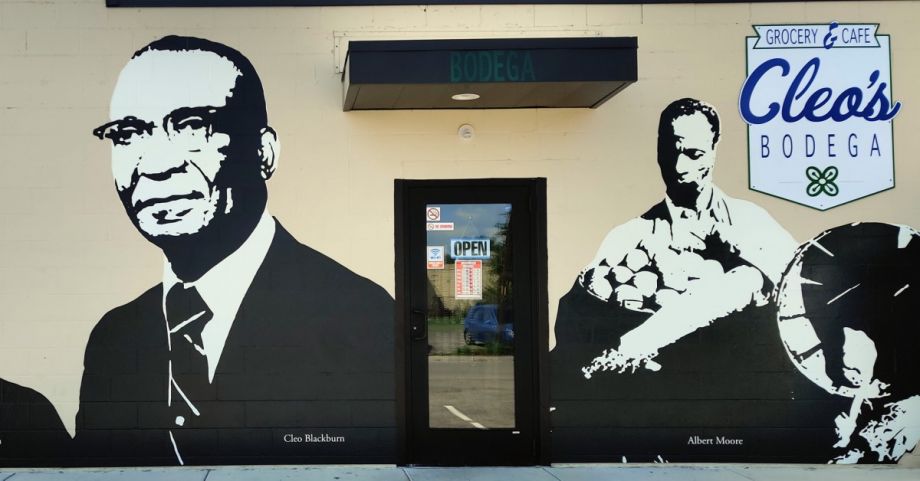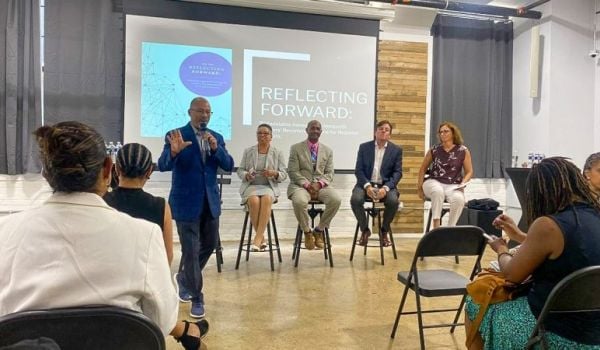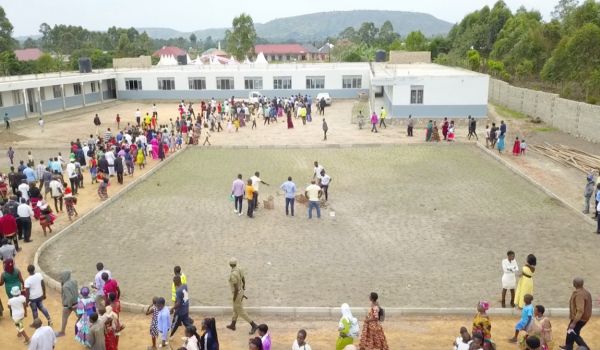In mid-April, Brandon Cosby looked around at the empty shelves inside Cleo’s Bodega, the only grocery store on the near northwest side of Indianapolis. Cosby is executive director at Flanner House, the nonprofit that owns the store, which took everything it had in stock and packaged it for emergency distribution after the COVID-19 pandemic hit.
“It was a little panic inducing,” says Cosby. “I spent the past two and a half years raising the funds and renovating that building to get everything set and stocked, and in a matter of three days it was empty again.”
There was more than just an empty store that weighed on Cosby. Sitting on his shoulders were around 20 employees and 122 years of history at the nonprofit, founded in 1898 by formerly enslaved persons during the Great Migration. It’s a legacy that stares you in the face when you walk up to Cleo’s, emblazoned with exterior murals of some of the organization’s past leaders.
Even through the pandemic, Flanner House and Cleo’s retained every employee, and maintained contracts with every local Black-owned vendor whose products are part of its offerings. In fact, it came back even stronger, with a new tradition of a “one-and-done” sandwich sold every Friday at the cafe attached to the bodega, which was able to start serving food in its outdoor seating area before the building re-opened again to customers. The last Friday before the bodega re-opened, it was smoked lamb with roasted red pepper and feta cheese. The next week it was smoked salmon with herbs, cheese, and capers.
“We start selling them at 11,” says Cosby. “People started showing up at 10 o’clock to get in line. It’s a good problem to have. It was a creative idea post shutdown as a way to get business to pick back up. And it worked.”
There is no secret sauce to this story. It’s not about one policy, one model, one partnership, one leader or even one generation of leaders. There is always more to any story in real life than can be captured in a thousand words and change, but this one is about the sum of decisions made going back decades that added up have positioned Flanner House and Cleo’s Bodega to make it through an unprecedented pandemic, so far, unscathed. It is the exception to the rule that nonprofit groups led by Black and Latino directors lag behind in fundraising compared to peer organizations with white leaders.
“Even now it’s still a dream job for me, running this organization, which was previously run by some of the most important people in the Black history of Indianapolis,” Cosby says.
Cleo’s Bodega is not the first grocery store Flanner House has run. Albert Allen Moore arrived in Indianapolis with a family and a bachelor’s degree in agriculture in 1934. He found work as the agriculture director at Flanner House, where he taught others from the Great Migration how to farm vacant lots within the city.
Within a few years, more than 200 families were farming six hundred garden plots on nearly one hundred acres of urban land on the city’s near north side. The agriculture program also established a shared cannery, and what folks didn’t need for themselves, they sold — through a co-op grocery store that the nonprofit established in the 1940s.
The city later seized the cannery and co-op grocery store as part of a federally-supported “urban renewal” plan to build a highway and later a hospital parking garage — a familiar scourge in Black inner city neighborhoods across the country. It was one of two properties the city took from Flanner House as part of urban renewal. The other was its headquarters.
Cleo’s Bodega is named for Cleo Blackburn, who led Flanner House during the middle of the 20th century when the city seized the nonprofit’s properties. Blackburn’s last act before retiring was securing a permanent home for the nonprofit.
“He wanted to make it so future directors wouldn’t have to go through being displaced again,” Cosby says.
Blackburn found two city-owned properties across from each other on what is now Doctor MLK Jr. Street. The nonprofit signed a 150-year lease with the city for $1 a year for each of the two properties. That was in 1976.
Flanner House’s headquarters has remained in one of those two buildings ever since. Until December 2018, it also housed a branch of the city library. A charter school also subleased space in the building until it closed after a cheating scandal in 2014.
The charter school scandal hit the organization hard. In addition to subleasing space in its main building, the nonprofit had licensed its name to the charter school, so its scandal hurt Flanner House’s reputation. By the time Cosby came to the organization in 2016, the organization was more than $800,000 in debt and on the brink of closing.
About five months into his tenure as executive director, Cosby had a plan in place to get out of debt, but he would soon throw that out the window. One day he got a call from the Lilly Endowment, the largest philanthropic foundation in the Indianapolis area and one of the largest in the country. The foundation gives almost entirely to organizations in the Indianapolis area, so it doesn’t have the national profile of other foundations its size.
“They said come in for a meeting and bring my board chair,” Cosby says. “I thought we were in some kind of trouble.”
But instead, the Lilly Endowment told Cosby they had selected Flanner House for the foundation’s 2017 round of financial sustainability grants. Cosby’s nonprofit got $5 million, part of which he used to pay off the organization’s debts and, per the terms of the grant, used the rest to establish a small endowment for the nonprofit itself. The interest and dividends from the endowment, up to five percent of the endowment’s value, get used to pay for existing staff and programs. Cosby says they also established a policy to avoid investing the endowment in alcohol, tobacco, prisons, guns and “any industry that has caused harm to Black communities.”
“All money isn’t good money,” Cosby says. “We have a moral obligation to use this money in the right way but we also have a moral obligation not to use that money to undermine the people in the community that we’re here to help.”
Cosby says he didn’t fully appreciate what the backing of the small endowment meant at the time. He was thinking initially that it would be nice to fund some new programs, but the ongoing interest coming off the endowment would give him the kind of freedom he didn’t know he needed until later.
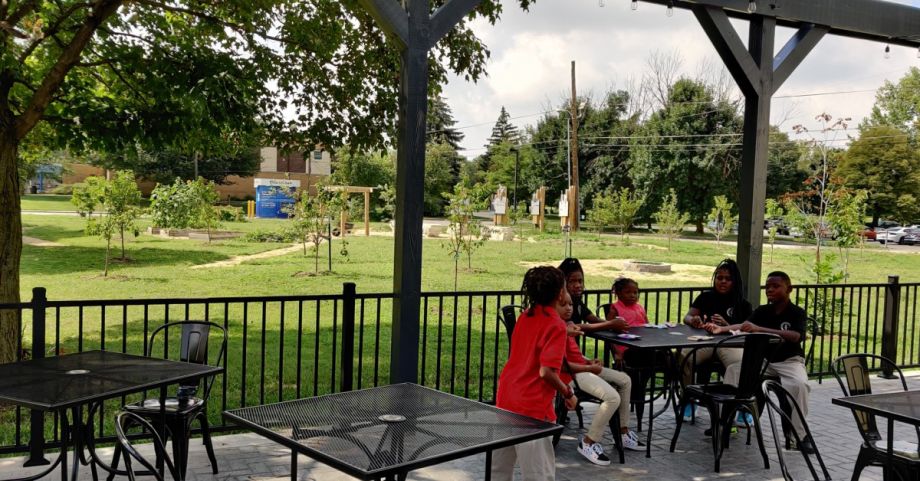
(Photo courtesy Justin Garrett Moore)
The realization came soon enough. In a community meeting with a developer, residents of the near northwest side expressed their desire for a grocery store with healthy food options. The census tract where Flanner House is located is the largest food desert in the city. Cosby says the developer brushed off the request, saying “beggars can’t be choosers.”
“So then I said to folks let’s go do it ourselves,” says Cosby. “Then I went home and had a panic attack, because I don’t usually go around promising to do something for folks I have no experience doing.”
In early discussions, including Flanner House’s board chair, who works with a national grocery store chain, Cosby realized that a typical 30,000 square-foot grocery store or even a smaller 10,000 square-foot store was too big a fixed cost to make sense. But he recalled from time spent living in New York City that bodegas were everywhere, and the business model was part of why it worked — fewer choices, but only the products that the immediate surrounding community wants, and in smaller but more frequently re-stocked volumes.
“People don’t go shopping for a whole week, they go shopping for a couple days,” says Cosby. “You give up choice in exchange for sustained, reliable access. So that’s what we chose to do.”
Cleo’s Bodega and Cafe is just 2,400 square feet. Flanner House applied for federal Community Development Block Grant funding, administered locally by the city. Expecting just a share of $400,000 for projects to address local food deserts, Flanner House got the whole pot, paying for the renovation and some working capital for the bodega. Other grant funding would bring startup costs for the operation to $987,000.
“We were fortunate to be able to open day one with absolutely no debt,” says Cosby. “So that made it much easier for us to grow the model and tweak and make necessary changes as we needed as we figured out.”
The cafe became part of the model early on in the planning phases. The bodega didn’t need the whole space, and the community was starved of gathering spaces since the loss of the library branch across the street. They also installed a community wifi connection, so that anyone who lives within a mile of the building can connect to the wifi network based at Cleo’s from home.
“We knew there was a need for a bodega but we really didn’t understand how important that cafe space would end up being,” says Cosby.
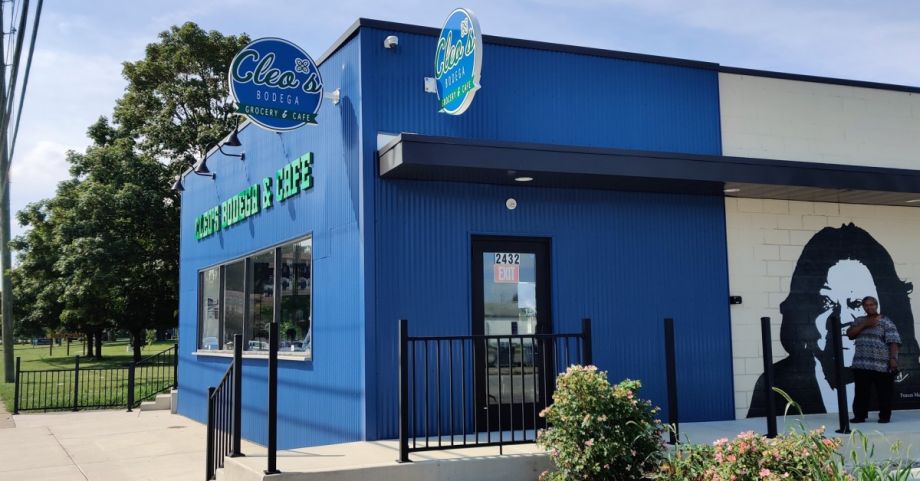
(Photo courtesy Justin Garrett Moore)
Cleo’s Bodega and Cafe celebrated its grand opening in June 2019. Cleo Blackburn and Albert Allen Moore were among those painted in a mural on the exterior of the building.
The cafe’s biggest seller, Cosby says, are variations on grilled cheese made using fancy butter created and supplied by a local seafood chef. The bodega also stocks lemonade, tea and other products from local drink-makers and locally made vegan baked goods. At least seven independent black-owned businesses supply products sold through the cafe or bodega, according to Cosby. Flanner House found ways to include products from all of them in the emergency relief packages during the pandemic so far, supporting more than 200 families a week.
“It’s been a crazy three and a half, four months,” says Cosby. With early childhood education and workforce development programs shut down, Cosby deployed 20 staff to emergency food relief and, in the middle of the pandemic, the urban farm adjacent to Cleo’s — which supplies the community first.
“Farming is nice because it’s not hard to social distance,” Cosby says. “Our farm occupies about two acres, so between focusing on getting beds ready for planting, taking care of 40,000 honeybees and 20 chickens, harvesting eggs, there’s never a shortage of work to be done.”
This article is part of The Bottom Line, a series exploring scalable solutions for problems related to affordability, inclusive economic growth and access to capital. Click here to subscribe to our Bottom Line newsletter.

Oscar is Next City's senior economic justice correspondent. He previously served as Next City’s editor from 2018-2019, and was a Next City Equitable Cities Fellow from 2015-2016. Since 2011, Oscar has covered community development finance, community banking, impact investing, economic development, housing and more for media outlets such as Shelterforce, B Magazine, Impact Alpha and Fast Company.
Follow Oscar .(JavaScript must be enabled to view this email address)



